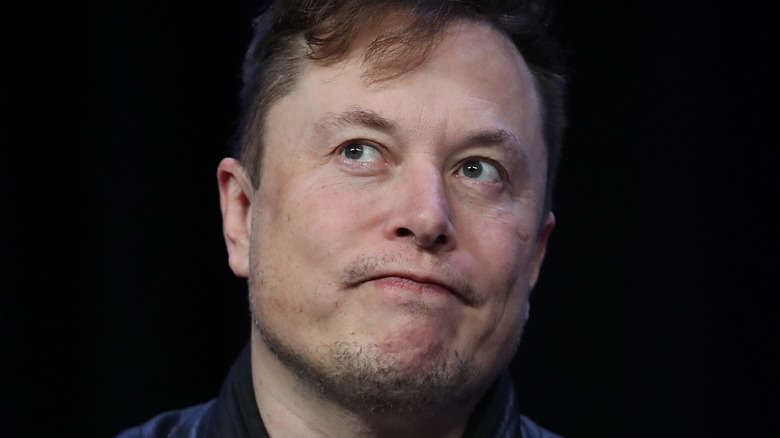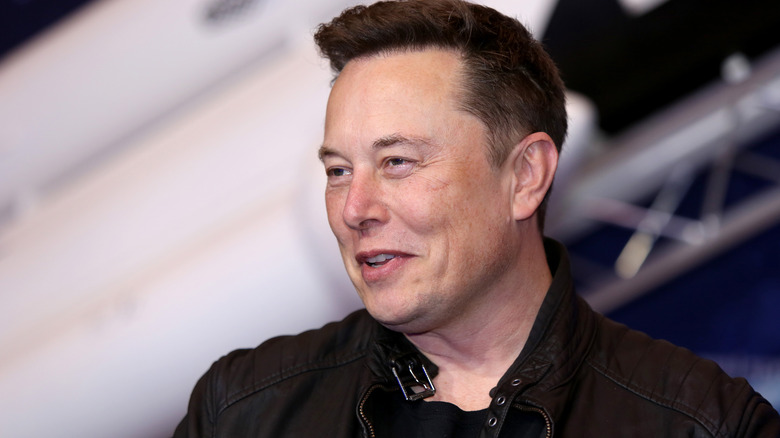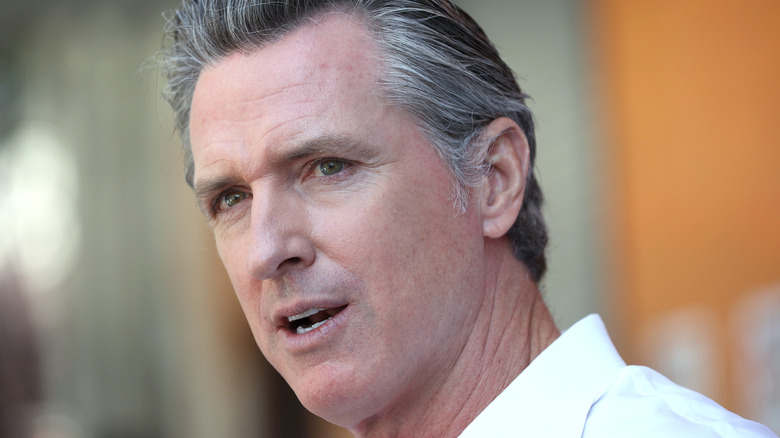Why Gavin Newsom Has Beef With Elon Musk
Back in 2018, Gavin Newsom was just another well-coiffed politician who was elected Governor of California. The Democrat wasted no time in implementing liberal policies, such as promoting marriage equality and pushing for the legalization of marijuana in the state, but it didn't take long for him to stir up some controversy. While he took an aggressive approach to stop the spread of COVID-19 in 2020, Newsom was spotted ignoring his own advice when he attended a birthday party late in the year, according to CNN. This "bad mistake," as Newsom called the dinner, gave his opponents a foothold to demand a recall to get the governor out of office. Though Newsom prevailed, the damage to his reputation may have already been done.
Like Newsom, Elon Musk has been another magnet for controversy. When the Tesla CEO and SpaceX founder isn't occupied with launching rockets into space, he can be found getting into Twitter brawls or landing into legal trouble with the U.S. stock market regulator. And Musk's love life isn't smooth sailing, either. As of September 24, the billionaire split with Canadian singer Grimes – after the two welcomed a son (whom they infamously named X Æ A-12 Musk). Because both Newsom and Musk call the state of California home, it seemed inevitable that they'd butt heads sooner rather than later. And indeed, the two have some serious beef dating back to 2020. Let's unpack it below.
Elon Musk got rebellious during the COVID-19 shutdowns
Relations first turned sour between Elon Musk and Gavin Newsom at the peak of the COVID-19 pandemic in 2020. Though factories and businesses had closed in accordance with local COVID guidelines, the governor expressed his belief that "an agreement could be reached to re-open the Tesla electric vehicle factory," per Forbes. But just after Newsom had spoken out, Musk took to his platform of choice — Twitter — to stir up some trouble. "Tesla is restarting production today against Alameda County rules," the Tesla co-founder wrote. "I will be on the line with everyone else. If anyone is arrested, I ask that it only be me." Rebellious!
Musk's tweet came in direct contradiction to Alameda County's interim public health officer, who'd stated that Tesla had not been cleared to resume production, according to CNBC. Musk also took aim at the public health officer personally, threatening via Twitter that Tesla would be filing a lawsuit as "the unelected & ignorant 'Interim Health Officer' of Alameda is acting contrary to the Governor, the President, our Constitutional freedoms & just plain common sense!" The back-and-forth only got more heated from there, as Musk called the stay-at-home orders "fascist" and expressed intentions to move Tesla headquarters out of the state. As things snowballed, everyone was looking to Newsom to step in, which he eventually did.
Elon Musk relocated to Texas over the disagreement
Elon Musk may have been preparing to leave California over the factory shutdown fight, but Gavin Newsom wasn't too worried, at least not as of May 2020. "I'm also not worried about Elon leaving anytime soon," the California governor said in an interview with Fast Money (via CNBC). He added, "I've had a lot of conversations with him, and we're committed to the success and the innovation and the low-carbon, green growth economy that he's been promoting for decades and the state of California is accelerating in."
Newsom went on to argue his case because the state itself had grown to become the leading player in electric vehicles, and therefore made sense as Tesla HQ. "I think it's in all our interests to continue to find areas of common ground and that's, by the way, exactly what we do in the state of California with Tesla," Newsom concluded, per Fast Money.
But Musk didn't see things in the same light. By December 2020, the billionaire started moving Tesla to Texas, making him "one of the highest-profile executives yet to leave California," according to The Wall Street Journal. The move underscored Musk's discontent with the state's coronavirus restrictions — and of course, it left California without Tesla's future tax revenue. The governor hasn't had much else to say since. Clearly, things between these two aren't as amicable as they used to be.



